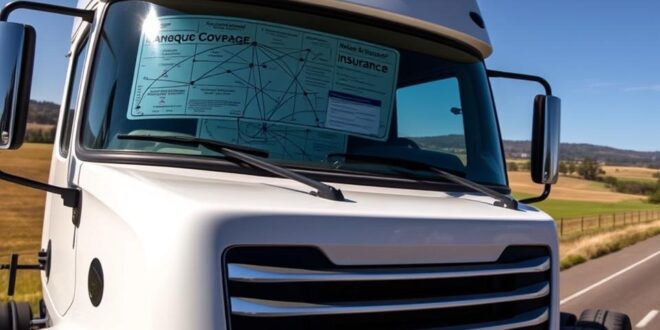Table of Contents
If you own or operate a truck, getting the right insurance coverage is key. Truck insurance helps protect your business and way of life. It covers accidents, damage, and unexpected events that could harm your operations.
Commercial truck insurance is made for the trucking world. It offers many coverage options for different businesses. Whether you’re moving goods long distances or doing local deliveries, the right truck insurance keeps you safe and in line with the law.
Key Takeaways
- Understand the importance of truck insurance for your business
- Learn about the different types of truck insurance coverage available
- Discover how to choose the right insurance policy for your needs
- Find out how to stay compliant with regulations and mitigate risk
- Get tips on managing your truck insurance costs effectively
Understanding Truck Insurance Basics
Knowing the basics of truck insurance is key to protecting your business. It also meets legal needs. Truck insurance covers the special risks of running commercial vehicles.
What Is Truck Insurance and Why It’s Essential
Truck insurance helps truck owners and operators avoid big financial losses. It covers accidents, theft, and other damages. The Federal Motor Carrier Safety Administration (FMCSA) says all commercial trucks in the US must have it.
It’s not just about following the law. It also protects your business from financial disaster. This can happen unexpectedly.
Legal Requirements for Truck Insurance in the US
The FMCSA sets the minimum insurance needs for commercial trucks. For trucks carrying non-hazardous materials, you need at least $750,000 in liability coverage. The table below shows the minimum insurance needs based on cargo type.
| Type of Cargo | Minimum Liability Coverage |
|---|---|
| Non-Hazardous Materials | $750,000 |
| Hazardous Materials | $1,000,000 to $5,000,000 |
| Oil or Hazardous Waste | $1,000,000 |
These rules help truck owners and operators pay for accidents or damages. They also protect the public.
Types of Truck Insurance Coverage
Truck owners need to understand different types of truck insurance coverage. The right insurance can save a business from financial disaster after accidents or other incidents.
Primary Liability Coverage
Primary liability coverage is key for truck insurance. It covers damages to others or property if the truck driver is at fault. This coverage helps protect the trucking company’s money. With primary liability coverage, truck owners avoid huge financial losses from accidents.
Physical Damage Coverage
Physical damage coverage includes collision and comprehsensive coverage. It protects the truck from damage. Collision covers accidents, while comprehsensive covers theft or natural disasters. This coverage keeps a trucking business financially healthy.
Cargo Insurance
Cargo insurance protects goods being transported from loss or damage. It’s vital for trucking companies to avoid financial losses from damaged or lost cargo. With cargo insurance, companies are covered for unexpected events.
Non-Trucking Liability Insurance
Non-trucking liability insurance, or bobtail insurance, covers the truck when not on a job. It’s important for protecting against liability when the truck is not working. This coverage fills a critical gap in insurance.
Commercial vs. Personal Truck Insurance
It’s important to know the difference between commercial and personal truck insurance in the U.S. The main difference is the vehicle’s use and the needed coverage.
Key Differences in Coverage Requirements
Commercial truck insurance has more coverage than personal truck insurance. Commercial vehicles are used for business, carry goods, and are on the road more. They need more coverage because they’re at higher risk. Commercial truck insurance includes liability, physical damage, and cargo coverage. Personal truck insurance is for those using trucks for personal use and doesn’t need as much coverage.
When You Need Commercial Coverage
You need commercial truck insurance for business use, like hauling goods or equipment. This includes driving for hire or transporting goods for a company. Even if you’re not a truck driver, if your business uses a truck, you’ll need commercial insurance. It’s key to check your situation to choose the right insurance.
Factors That Affect Truck Insurance Costs
Knowing what affects truck insurance costs is key to saving money. Many things can change how much you pay for insurance. Each one plays a big part in the final cost.
Driving History and Experience
Your driving history and experience are very important. A clean record can lower your insurance costs a lot. But, if you’ve had accidents or tickets, you’ll pay more.
Type and Age of Truck
The type and age of your truck also matter. New trucks or those with safety features might cost less to insure. But, older trucks might be cheaper but could need more repairs.
The make and model of your truck can also change your rates. This is because different trucks cost more to fix and have different safety ratings.

Coverage Limits and Deductibles
How much coverage you choose and your deductibles also affect costs. More coverage and lower deductibles mean higher premiums. It’s important to find a balance between enough coverage and affordable costs.
Operating Radius and Cargo Type
Where you drive and what you carry also matter. Trucks that drive far or carry dangerous goods cost more to insure. Knowing these details helps you choose the right insurance.
| Factor | Impact on Insurance Costs |
|---|---|
| Driving History and Experience | A clean driving record can lower premiums |
| Type and Age of Truck | Newer trucks with safety features may reduce costs |
| Coverage Limits and Deductibles | Higher coverage and lower deductibles increase premiums |
| Operating Radius and Cargo Type | Longer distances and hazardous cargo increase costs |
How to Choose the Right Truck Insurance Policy
Finding the right truck insurance can be tricky. You need to know what you need and what’s out there.
When picking truck insurance, start by thinking about what you need. Look at the cargo you carry, the value of your trucks, and the risks you face.
Assessing Your Specific Needs
Think about the cost of your trucks, how far you drive, and claim history in your area. This helps figure out how much coverage you need.
If you carry expensive goods, you might want extra cargo insurance. This protects against loss or damage.
| Coverage Type | Description | Typical Use Case |
|---|---|---|
| Primary Liability | Covers damages to other parties in an accident | Essential for all trucking operations |
| Cargo Insurance | Protects against loss or damage of goods | High-value or sensitive cargo |
| Physical Damage | Covers repairs or replacement of your truck | Required for financed or leased trucks |
Comparing Insurance Providers
After knowing what you need, it’s time to compare insurance providers. Look for ones with a good reputation, fair prices, and lots of coverage options.
Get quotes from several providers. Then, check the details of each policy carefully.
Reading the Fine Print
Before you decide, make sure to read the fine print of your policy. Know about deductibles, coverage limits, and any exclusions or conditions.
By looking at your options and understanding your policy, you can make sure you have the right coverage for your trucking business.
Tips to Save Money on Truck Insurance
It’s possible to cut down on truck insurance costs with smart choices and insurance knowledge. By using the right strategies, truck owners can lower their insurance bills without losing coverage quality.
Bundle Insurance Policies
Many insurance companies give discounts for bundling policies. This means combining truck insurance with other business or personal policies. Bundling policies can make management easier and save a lot of money.
Maintain a Clean Driving Record
Keeping a clean driving record is key to lower insurance rates. Staying accident-free and avoiding traffic tickets can lead to big discounts. Insurance companies see drivers with clean records as less risky, so they charge less.
Implement Safety Programs and Technology
Using safety programs and advanced tech can lower accident risks and insurance costs. This includes telematics, dash cams, and driver training. These steps not only save money but also improve safety on the roads.
Consider Higher Deductibles
Choosing higher deductibles can lower insurance premiums. But, make sure the deductible is affordable in case of a claim. Truck owners should think carefully before deciding.
Regular Policy Reviews
It’s important to regularly check and update insurance policies. This ensures they stay relevant and cost-effective. It helps spot any unnecessary coverage and make changes to save money.
Conclusion
Understanding truck insurance is key to protecting your business and keeping your finances safe. This article has covered the basics, types of coverage, and what affects costs.
A truck insurance summary shows why picking the right policy is vital. Think about your driving history, truck type and age, and coverage limits. Tips like bundling policies, keeping a clean driving record, and safety programs can also save you money.
When choosing a policy, know what you need and compare different providers. Reading the fine print is important to avoid surprises. With the knowledge from this article, you can get the right coverage for your business and assets.
FAQ
What is the minimum liability coverage required by the FMCSA for truck insurance?
What types of truck insurance coverage are available?
How do I determine whether I need commercial or personal truck insurance?
What factors affect truck insurance costs?
How can I lower my truck insurance premiums?
What should I consider when choosing a truck insurance policy?




